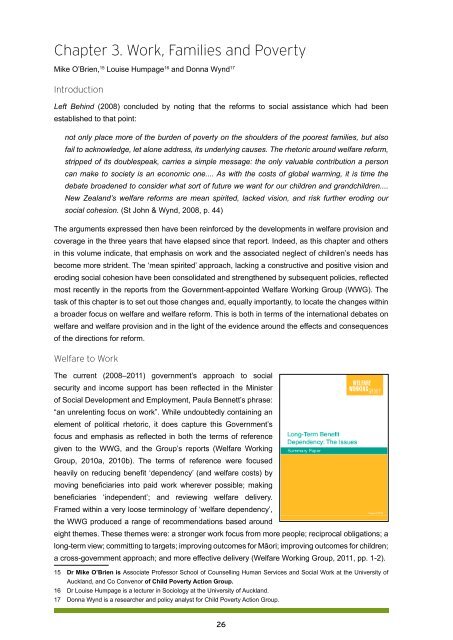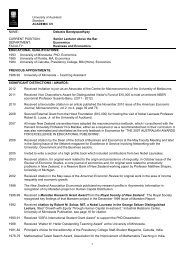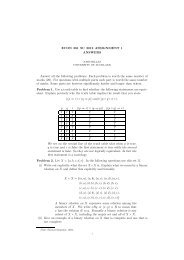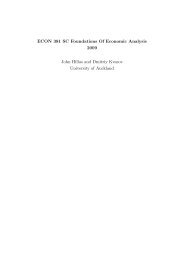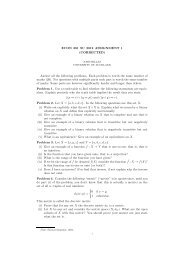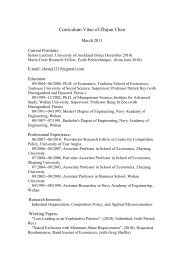Left Further Behind - Child Poverty Action Group
Left Further Behind - Child Poverty Action Group
Left Further Behind - Child Poverty Action Group
You also want an ePaper? Increase the reach of your titles
YUMPU automatically turns print PDFs into web optimized ePapers that Google loves.
Chapter 3. Work, Families and <strong>Poverty</strong><br />
Mike O’Brien, 15 Louise Humpage 16 and Donna Wynd 17<br />
Introduction<br />
<strong>Left</strong> <strong>Behind</strong> (2008) concluded by noting that the reforms to social assistance which had been<br />
established to that point:<br />
not only place more of the burden of poverty on the shoulders of the poorest families, but also<br />
fail to acknowledge, let alone address, its underlying causes. The rhetoric around welfare reform,<br />
stripped of its doublespeak, carries a simple message: the only valuable contribution a person<br />
can make to society is an economic one.... As with the costs of global warming, it is time the<br />
debate broadened to consider what sort of future we want for our children and grandchildren....<br />
New Zealand’s welfare reforms are mean spirited, lacked vision, and risk further eroding our<br />
social cohesion. (St John & Wynd, 2008, p. 44)<br />
The arguments expressed then have been reinforced by the developments in welfare provision and<br />
coverage in the three years that have elapsed since that report. Indeed, as this chapter and others<br />
in this volume indicate, that emphasis on work and the associated neglect of children’s needs has<br />
become more strident. The ‘mean spirited’ approach, lacking a constructive and positive vision and<br />
eroding social cohesion have been consolidated and strengthened by subsequent policies, reflected<br />
most recently in the reports from the Government-appointed Welfare Working <strong>Group</strong> (WWG). The<br />
task of this chapter is to set out those changes and, equally importantly, to locate the changes within<br />
a broader focus on welfare and welfare reform. This is both in terms of the international debates on<br />
welfare and welfare provision and in the light of the evidence around the effects and consequences<br />
of the directions for reform.<br />
Welfare to Work<br />
The current (2008–2011) government’s approach to social<br />
security and income support has been reflected in the Minister<br />
of Social Development and Employment, Paula Bennett’s phrase:<br />
“an unrelenting focus on work”. While undoubtedly containing an<br />
element of political rhetoric, it does capture this Government’s<br />
focus and emphasis as reflected in both the terms of reference<br />
given to the WWG, and the <strong>Group</strong>’s reports (Welfare Working<br />
<strong>Group</strong>, 2010a, 2010b). The terms of reference were focused<br />
heavily on reducing benefit ‘dependency’ (and welfare costs) by<br />
moving beneficiaries into paid work wherever possible; making<br />
beneficiaries ‘independent’; and reviewing welfare delivery.<br />
Framed within a very loose terminology of ‘welfare dependency’,<br />
the WWG produced a range of recommendations based around<br />
eight themes. These themes were: a stronger work focus from more people; reciprocal obligations; a<br />
long-term view; committing to targets; improving outcomes for Māori; improving outcomes for children;<br />
a cross-government approach; and more effective delivery (Welfare Working <strong>Group</strong>, 2011, pp. 1-2).<br />
15 Dr Mike O’Brien is Associate Professor School of Counselling Human Services and Social Work at the University of<br />
Auckland, and Co Convenor of <strong>Child</strong> <strong>Poverty</strong> <strong>Action</strong> <strong>Group</strong>.<br />
16 Dr Louise Humpage is a lecturer in Sociology at the University of Auckland.<br />
17 Donna Wynd is a researcher and policy analyst for <strong>Child</strong> <strong>Poverty</strong> <strong>Action</strong> <strong>Group</strong>.<br />
26


